人教版(2019)必修第一册Unit 3 Sports and fitness Discovering useful structures 课件(共14张PPT)
文档属性
| 名称 | 人教版(2019)必修第一册Unit 3 Sports and fitness Discovering useful structures 课件(共14张PPT) |  | |
| 格式 | pptx | ||
| 文件大小 | 319.8KB | ||
| 资源类型 | 教案 | ||
| 版本资源 | 人教版(2019) | ||
| 科目 | 英语 | ||
| 更新时间 | 2023-11-02 20:49:57 | ||
图片预览

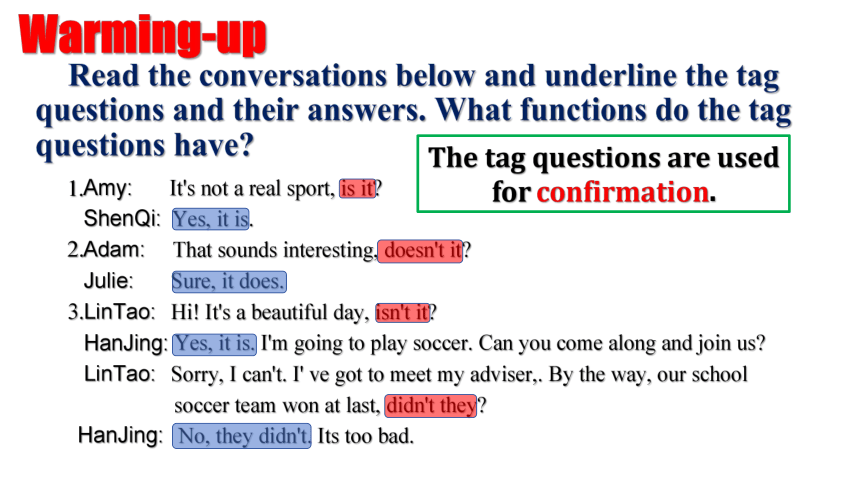
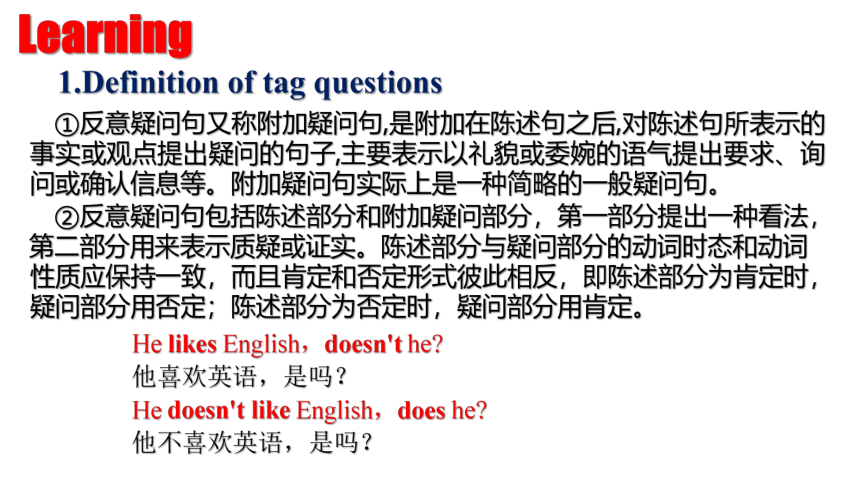
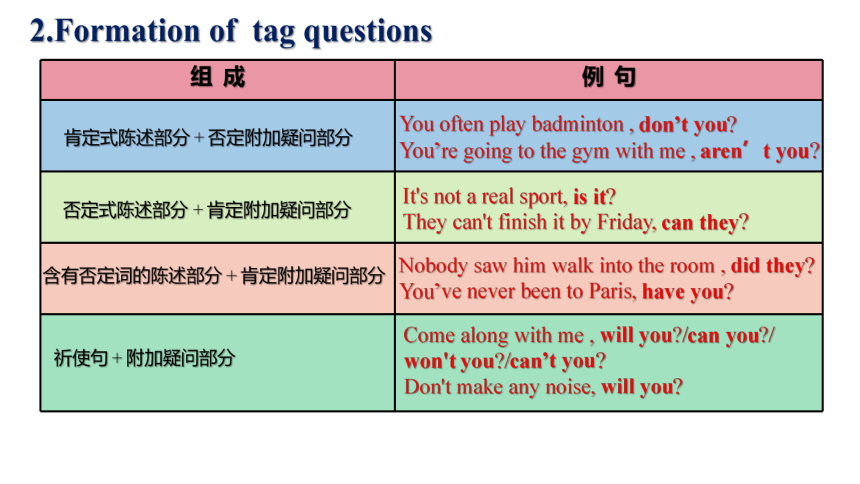
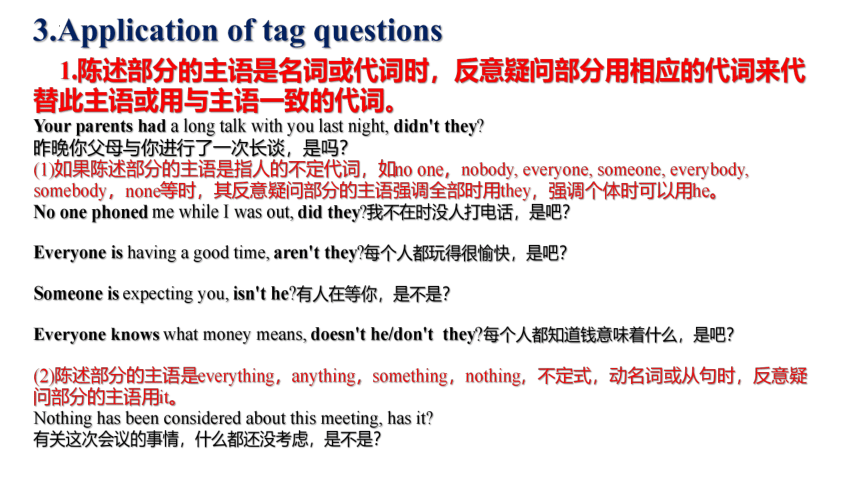
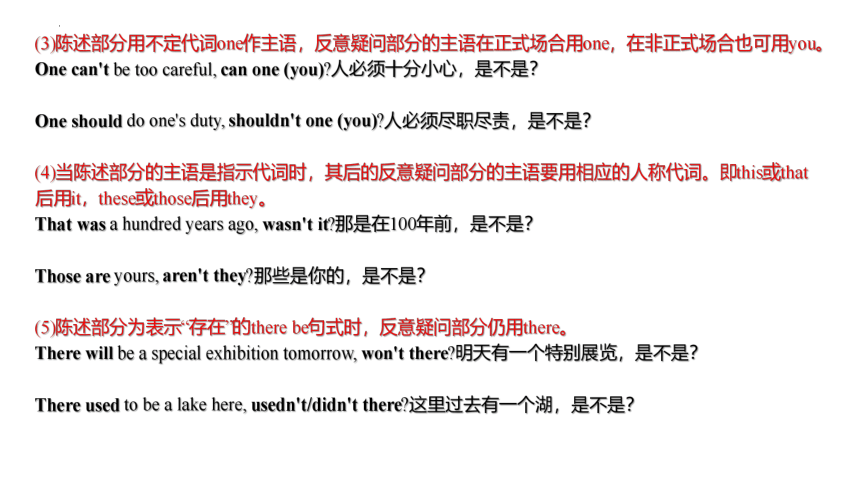
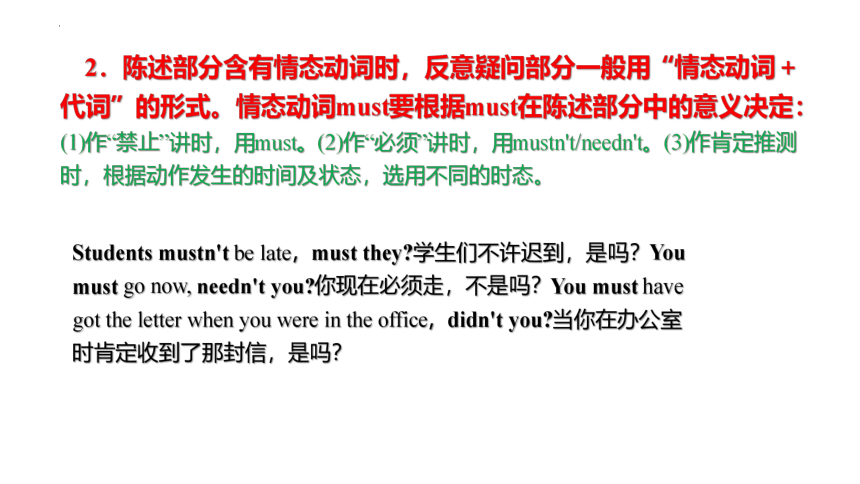
文档简介
(共14张PPT)
Discovering Useful Structures
Make small conversations
Warming-up
Read the conversations below and underline the tag questions and their answers. What functions do the tag questions have
1.Amy: It's not a real sport, is it
ShenQi: Yes, it is.
2.Adam: That sounds interesting, doesn't it
Julie: Sure, it does.
3.LinTao: Hi! It's a beautiful day, isn't it
HanJing: Yes, it is. I'm going to play soccer. Can you come along and join us
LinTao: Sorry, I can't. I' ve got to meet my adviser,. By the way, our school
soccer team won at last, didn't they
HanJing: No, they didn't. Its too bad.
The tag questions are used for confirmation.
Learning
1.Definition of tag questions
①反意疑问句又称附加疑问句,是附加在陈述句之后,对陈述句所表示的事实或观点提出疑问的句子,主要表示以礼貌或委婉的语气提出要求、询问或确认信息等。附加疑问句实际上是一种简略的一般疑问句。
②反意疑问句包括陈述部分和附加疑问部分,第一部分提出一种看法,第二部分用来表示质疑或证实。陈述部分与疑问部分的动词时态和动词性质应保持一致,而且肯定和否定形式彼此相反,即陈述部分为肯定时,疑问部分用否定;陈述部分为否定时,疑问部分用肯定。
He likes English,doesn't he
他喜欢英语,是吗?
He doesn't like English,does he
他不喜欢英语,是吗?
2.Formation of tag questions
组 成 例 句
肯定式陈述部分 + 否定附加疑问部分
You often play badminton , don’t you
You’re going to the gym with me , aren’t you
否定式陈述部分 + 肯定附加疑问部分
It's not a real sport, is it
They can't finish it by Friday, can they
含有否定词的陈述部分 + 肯定附加疑问部分
Nobody saw him walk into the room , did they
You’ve never been to Paris, have you
祈使句 + 附加疑问部分
Come along with me , will you /can you /
won't you /can’t you
Don't make any noise, will you
3.Application of tag questions
1.陈述部分的主语是名词或代词时,反意疑问部分用相应的代词来代替此主语或用与主语一致的代词。
Your parents had a long talk with you last night, didn't they
昨晚你父母与你进行了一次长谈,是吗?
(1)如果陈述部分的主语是指人的不定代词,如no one,nobody, everyone, someone, everybody, somebody,none等时,其反意疑问部分的主语强调全部时用they,强调个体时可以用he。
No one phoned me while I was out, did they 我不在时没人打电话,是吧?
Everyone is having a good time, aren't they 每个人都玩得很愉快,是吧?
Someone is expecting you, isn't he 有人在等你,是不是?
Everyone knows what money means, doesn't he/don't they 每个人都知道钱意味着什么,是吧?
(2)陈述部分的主语是everything,anything,something,nothing,不定式,动名词或从句时,反意疑问部分的主语用it。
Nothing has been considered about this meeting, has it
有关这次会议的事情,什么都还没考虑,是不是?
(3)陈述部分用不定代词one作主语,反意疑问部分的主语在正式场合用one,在非正式场合也可用you。
One can't be too careful, can one (you) 人必须十分小心,是不是?
One should do one's duty, shouldn't one (you) 人必须尽职尽责,是不是?
(4)当陈述部分的主语是指示代词时,其后的反意疑问部分的主语要用相应的人称代词。即this或that后用it,these或those后用they。
That was a hundred years ago, wasn't it 那是在100年前,是不是?
Those are yours, aren't they 那些是你的,是不是?
(5)陈述部分为表示“存在”的there be句式时,反意疑问部分仍用there。
There will be a special exhibition tomorrow, won't there 明天有一个特别展览,是不是?
There used to be a lake here, usedn't/didn't there 这里过去有一个湖,是不是?
2.陈述部分含有情态动词时,反意疑问部分一般用“情态动词+代词”的形式。情态动词must要根据must在陈述部分中的意义决定:
(1)作“禁止”讲时,用must。(2)作“必须”讲时,用mustn't/needn't。(3)作肯定推测时,根据动作发生的时间及状态,选用不同的时态。
Students mustn't be late,must they 学生们不许迟到,是吗?You must go now, needn't you 你现在必须走,不是吗?You must have got the letter when you were in the office,didn't you 当你在办公室时肯定收到了那封信,是吗?
3.陈述部分中用了表示否定或半否定的词,如neither,none,nobody, nothing, few, little, never, hardly, seldom等,这时反意疑问部分一般用肯定形式。但陈述部分含有带否定意义的前缀或后缀的词时,反意疑问部分用否定式。
He has few friends here, has he 他在这儿几乎没什么朋友,是吗?She seldom argues with others, does she 她很少与别人争吵,是吗?They are hopeless, aren't they 他们没有希望了,是不是?It is impossible, isn't it 那是不可能的,是吗?
4.肯定的祈使句的反意疑问部分可用will you或won't you,否定的祈使句的反意疑问部分用will you。注意Let's开头的祈使句,反意疑问部分用shall we。
Turn off the lights when you leave the classroom, will/won't you
当你离开教室时关上灯,好吗? Don't play with fire, will you
不要玩火,好吗? Let's go home, shall we
我们回家吧,好吗?
5.在主从复合句中,反意疑问部分一般与主句的谓语一致,但当主句主语是第一人称,并且谓语部分为think, believe, imagine, suppose等时,反意疑问部分一般与从句的谓语一致。
They told me it was not true, didn't they
他们告诉我这不是真的,是吗? I believe she can finish the work within five minutes,can't she
我相信她能在5分钟内完成这项工作,她能吗?
4.Response to tag questions
在回答反意疑问句时,不管其陈述部分是肯定的还是否定的,若事实是肯定的,则用“Yes+肯定的简略句来回答”;若事实是否定的,则用“No+否定的简略句”来回答,形式要一致。陈述部分是否定形式时,答语中的Yes译成“不”,No译成“是”。
—He wants to go, doesn't he —Yes,he does./No,he doesn't.—他想去,是吗?—是的,他想去。/不,他不想去。—That isn't a useful book, is it —Yes, it is./No, it isn't.—那不是一本有用的书,是吗?—不,它是一本有用的书。/是的,它不是一本有用的书。
Practice
Host: You've lived in Hollywood for many years,1.__________?Guest: Since I was eighteen and came here to write my first screenplay.Host: You didn't know anyone here at first, 2.__________?Guest: No. And I didn't have a cent to my name. Just some ideas and a lot of
hope.It sounds crazy,3.__________?Host: But things have worked out for you,4.__________? You're working on
another screenplay now,5.__________?Guest: Yes.It's a comedy about some kids who become invisible.Host: Speaking of kids, you have some of your own, 6.______________?Guest: Two boys and a girl—all very visible!Host: I know what you mean.Do you ever wish they were invisible Guest: Now,that's an interesting thought,7.__________?
1.Complete the blanks with tag questions.
isn't it
don't/haven't you
aren't you
haven't they
doesn't it
did you
haven't you
2.Complete the conversations with appropriate tag questions or correct answers. Then act them out.
1. A: It's not going to rain, is it
B: ___________ It's a good day for sports.
A: Then we can play football, _________
B: ____________. We don't have a ball.
2. A: It's Sports Day next Thursday, _______
B: You' re right, it is. Let's ask Xia Lei if she wants to join a team.
A: She likes soccer, ___________
B: ____________ But she loves volleyball She could be in the volleyball team.
3. A: It's time for badminton class. Where is the coach He's late, __________
B: It's been 10 minutes already. He isn't coming, ___________
A: Cool! We can have a good time. That's great!
B: Shh!
A: Oh no, he's right behind me,_________
C: Yes, I am!
isn’t he
is he
isn’t he
No, it isn’t.
can’t we
No, we can’t
isn’t it
doesn’t she
No, she doesn’t.
3.Work in pairs.Use tag questions to role-play one of the situations below.
Sample Conversation 1
A: The Sports Day is coming
soon,isn’t it
B: Yes, it is. They need some
volunteers, don’t they
A: Yes, they do. We should
volunteer,shouldn’t we
B: Yes, we should.
Sample Conversation 2
A: Wow, Chen Liang can jump really
high, can’t he
B: He sure can! We are going to
win,aren’t we
A: I think so. The other team must
score 10 points in two minutes. It
can’t be done, can it
B: I don’t think so. I’ll be right back ...
Oh no! The other team didn’t win,
did they
A: I’m afraid so!
Discovering Useful Structures
Make small conversations
Warming-up
Read the conversations below and underline the tag questions and their answers. What functions do the tag questions have
1.Amy: It's not a real sport, is it
ShenQi: Yes, it is.
2.Adam: That sounds interesting, doesn't it
Julie: Sure, it does.
3.LinTao: Hi! It's a beautiful day, isn't it
HanJing: Yes, it is. I'm going to play soccer. Can you come along and join us
LinTao: Sorry, I can't. I' ve got to meet my adviser,. By the way, our school
soccer team won at last, didn't they
HanJing: No, they didn't. Its too bad.
The tag questions are used for confirmation.
Learning
1.Definition of tag questions
①反意疑问句又称附加疑问句,是附加在陈述句之后,对陈述句所表示的事实或观点提出疑问的句子,主要表示以礼貌或委婉的语气提出要求、询问或确认信息等。附加疑问句实际上是一种简略的一般疑问句。
②反意疑问句包括陈述部分和附加疑问部分,第一部分提出一种看法,第二部分用来表示质疑或证实。陈述部分与疑问部分的动词时态和动词性质应保持一致,而且肯定和否定形式彼此相反,即陈述部分为肯定时,疑问部分用否定;陈述部分为否定时,疑问部分用肯定。
He likes English,doesn't he
他喜欢英语,是吗?
He doesn't like English,does he
他不喜欢英语,是吗?
2.Formation of tag questions
组 成 例 句
肯定式陈述部分 + 否定附加疑问部分
You often play badminton , don’t you
You’re going to the gym with me , aren’t you
否定式陈述部分 + 肯定附加疑问部分
It's not a real sport, is it
They can't finish it by Friday, can they
含有否定词的陈述部分 + 肯定附加疑问部分
Nobody saw him walk into the room , did they
You’ve never been to Paris, have you
祈使句 + 附加疑问部分
Come along with me , will you /can you /
won't you /can’t you
Don't make any noise, will you
3.Application of tag questions
1.陈述部分的主语是名词或代词时,反意疑问部分用相应的代词来代替此主语或用与主语一致的代词。
Your parents had a long talk with you last night, didn't they
昨晚你父母与你进行了一次长谈,是吗?
(1)如果陈述部分的主语是指人的不定代词,如no one,nobody, everyone, someone, everybody, somebody,none等时,其反意疑问部分的主语强调全部时用they,强调个体时可以用he。
No one phoned me while I was out, did they 我不在时没人打电话,是吧?
Everyone is having a good time, aren't they 每个人都玩得很愉快,是吧?
Someone is expecting you, isn't he 有人在等你,是不是?
Everyone knows what money means, doesn't he/don't they 每个人都知道钱意味着什么,是吧?
(2)陈述部分的主语是everything,anything,something,nothing,不定式,动名词或从句时,反意疑问部分的主语用it。
Nothing has been considered about this meeting, has it
有关这次会议的事情,什么都还没考虑,是不是?
(3)陈述部分用不定代词one作主语,反意疑问部分的主语在正式场合用one,在非正式场合也可用you。
One can't be too careful, can one (you) 人必须十分小心,是不是?
One should do one's duty, shouldn't one (you) 人必须尽职尽责,是不是?
(4)当陈述部分的主语是指示代词时,其后的反意疑问部分的主语要用相应的人称代词。即this或that后用it,these或those后用they。
That was a hundred years ago, wasn't it 那是在100年前,是不是?
Those are yours, aren't they 那些是你的,是不是?
(5)陈述部分为表示“存在”的there be句式时,反意疑问部分仍用there。
There will be a special exhibition tomorrow, won't there 明天有一个特别展览,是不是?
There used to be a lake here, usedn't/didn't there 这里过去有一个湖,是不是?
2.陈述部分含有情态动词时,反意疑问部分一般用“情态动词+代词”的形式。情态动词must要根据must在陈述部分中的意义决定:
(1)作“禁止”讲时,用must。(2)作“必须”讲时,用mustn't/needn't。(3)作肯定推测时,根据动作发生的时间及状态,选用不同的时态。
Students mustn't be late,must they 学生们不许迟到,是吗?You must go now, needn't you 你现在必须走,不是吗?You must have got the letter when you were in the office,didn't you 当你在办公室时肯定收到了那封信,是吗?
3.陈述部分中用了表示否定或半否定的词,如neither,none,nobody, nothing, few, little, never, hardly, seldom等,这时反意疑问部分一般用肯定形式。但陈述部分含有带否定意义的前缀或后缀的词时,反意疑问部分用否定式。
He has few friends here, has he 他在这儿几乎没什么朋友,是吗?She seldom argues with others, does she 她很少与别人争吵,是吗?They are hopeless, aren't they 他们没有希望了,是不是?It is impossible, isn't it 那是不可能的,是吗?
4.肯定的祈使句的反意疑问部分可用will you或won't you,否定的祈使句的反意疑问部分用will you。注意Let's开头的祈使句,反意疑问部分用shall we。
Turn off the lights when you leave the classroom, will/won't you
当你离开教室时关上灯,好吗? Don't play with fire, will you
不要玩火,好吗? Let's go home, shall we
我们回家吧,好吗?
5.在主从复合句中,反意疑问部分一般与主句的谓语一致,但当主句主语是第一人称,并且谓语部分为think, believe, imagine, suppose等时,反意疑问部分一般与从句的谓语一致。
They told me it was not true, didn't they
他们告诉我这不是真的,是吗? I believe she can finish the work within five minutes,can't she
我相信她能在5分钟内完成这项工作,她能吗?
4.Response to tag questions
在回答反意疑问句时,不管其陈述部分是肯定的还是否定的,若事实是肯定的,则用“Yes+肯定的简略句来回答”;若事实是否定的,则用“No+否定的简略句”来回答,形式要一致。陈述部分是否定形式时,答语中的Yes译成“不”,No译成“是”。
—He wants to go, doesn't he —Yes,he does./No,he doesn't.—他想去,是吗?—是的,他想去。/不,他不想去。—That isn't a useful book, is it —Yes, it is./No, it isn't.—那不是一本有用的书,是吗?—不,它是一本有用的书。/是的,它不是一本有用的书。
Practice
Host: You've lived in Hollywood for many years,1.__________?Guest: Since I was eighteen and came here to write my first screenplay.Host: You didn't know anyone here at first, 2.__________?Guest: No. And I didn't have a cent to my name. Just some ideas and a lot of
hope.It sounds crazy,3.__________?Host: But things have worked out for you,4.__________? You're working on
another screenplay now,5.__________?Guest: Yes.It's a comedy about some kids who become invisible.Host: Speaking of kids, you have some of your own, 6.______________?Guest: Two boys and a girl—all very visible!Host: I know what you mean.Do you ever wish they were invisible Guest: Now,that's an interesting thought,7.__________?
1.Complete the blanks with tag questions.
isn't it
don't/haven't you
aren't you
haven't they
doesn't it
did you
haven't you
2.Complete the conversations with appropriate tag questions or correct answers. Then act them out.
1. A: It's not going to rain, is it
B: ___________ It's a good day for sports.
A: Then we can play football, _________
B: ____________. We don't have a ball.
2. A: It's Sports Day next Thursday, _______
B: You' re right, it is. Let's ask Xia Lei if she wants to join a team.
A: She likes soccer, ___________
B: ____________ But she loves volleyball She could be in the volleyball team.
3. A: It's time for badminton class. Where is the coach He's late, __________
B: It's been 10 minutes already. He isn't coming, ___________
A: Cool! We can have a good time. That's great!
B: Shh!
A: Oh no, he's right behind me,_________
C: Yes, I am!
isn’t he
is he
isn’t he
No, it isn’t.
can’t we
No, we can’t
isn’t it
doesn’t she
No, she doesn’t.
3.Work in pairs.Use tag questions to role-play one of the situations below.
Sample Conversation 1
A: The Sports Day is coming
soon,isn’t it
B: Yes, it is. They need some
volunteers, don’t they
A: Yes, they do. We should
volunteer,shouldn’t we
B: Yes, we should.
Sample Conversation 2
A: Wow, Chen Liang can jump really
high, can’t he
B: He sure can! We are going to
win,aren’t we
A: I think so. The other team must
score 10 points in two minutes. It
can’t be done, can it
B: I don’t think so. I’ll be right back ...
Oh no! The other team didn’t win,
did they
A: I’m afraid so!
